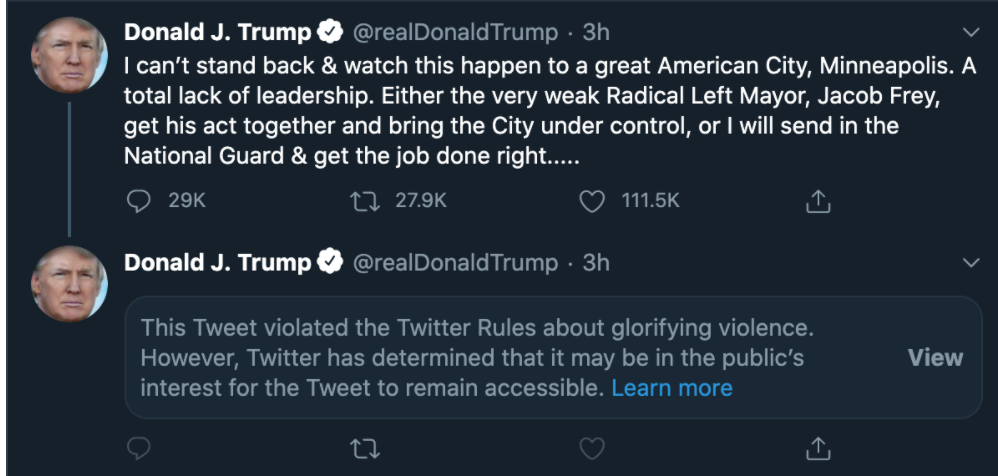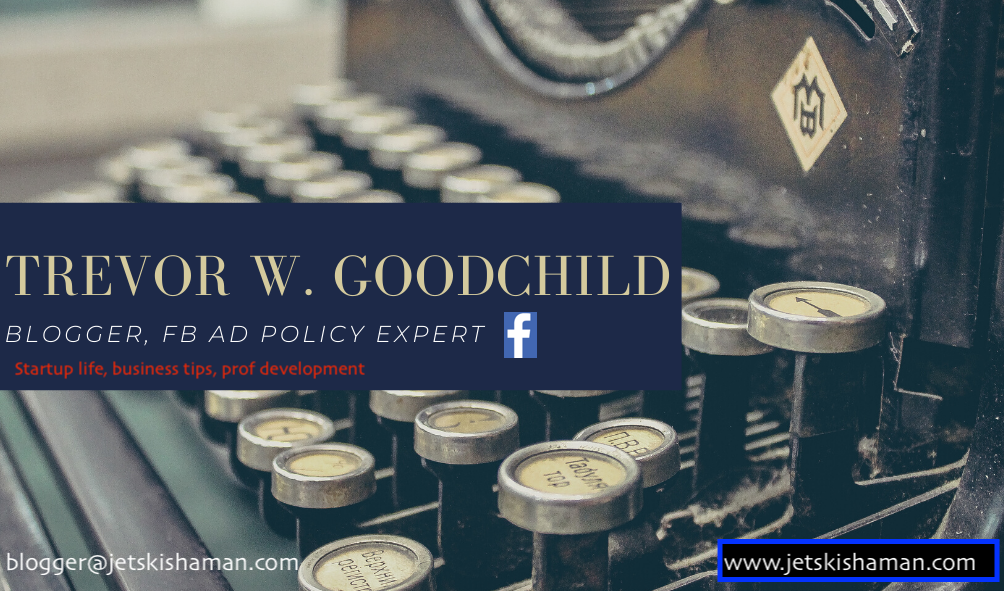
Credit: dole777
My last blog discussed how entrepreneurs to go from good to great and today we're going to dive into tech news as Trump faces off a battle with Twitter and free speech.
Twitter has started labeling questionable tweets the president has made with a little “i” and a warning.
Due to the shut downs implemented by national & local governments, responding to COVID19, many states are considering mail-in voting ballots as the most viable option to avoid long lines and crowds.
Trump tweeted that mail-in voting would lead to voting fraud and stated sensationally, that:
“Mail boxes will be robbed, ballots will be forged & even illegally printed out & fraudulently signed.”
Twitter responded with a warning that implied this was all fiction:

When interviewed by media sources like TechCrunch, Twitter stated Trumps tweets “contain potentially misleading information about voting processes and have been labeled to provide additional context around mail-in ballots.”
But the intrigue doesn’t stop there. A few days later after the fact-checking label Twitter labeled another one of Trump’s tweets with a “Public Interest Notice.” This label states that he broke Twitter’s rules about promoting violence on the platform.

Trump reposted this on Facebook and Instagram before Twitter came down on his post for glorifying violence.
CEO of Facebook, Mark Zuckerberg, while defending Facebook’s policy to not fact-check politicians has stated there are limitations to what is allowed on Facebook.
“Even for politicians we don't allow content that incites violence or risks imminent harm — and of course we don't allow voter suppression,”
- Mark Zuckerberg
Trump threatening to send in the national guard was in reference to the situation in Minneapolis where there are tons of riots in response to a white police officer killing a black man who posed no threat to the police.
The man’s name was George Floyd. A shop keeper had called the cops because he suspected Floyd was using counterfeit money.
Floyd was being led away, peacefully in hand cuffs, but moments later the police had him on the ground. George Floyd was filmed dying with a cop's knee on his neck as he begged for mercy saying,
"I can't breath!"
"I'm about to die."
Floyd died, without cause, or justifiable reason for being killed. It is thought to be a racially motivated killing by the police as there has been a history of police killing blacks without just cause in in Minneapolis and America as a whole (just like Eric Garner died in New York for selling loose cigarettes).
The public's response to the blatant killing, on camera, of Floyd, without cause, by the Minneapolis PD is rioting in multiple cities and states.
Trump said, in response to the protesters of Floyd's death:
“When the looting starts, the shooting starts,”
This statement being an outright threat of violence and murder against American citizens, unhappy with the way George Floyd was murdered by the Minneapolis police.
The policy that this tweet violates is listed in Twitter’s policies, visible to anyone in the public that takes the time to read them:
You may not threaten violence against an individual or a group of people.”
Twitter, Facebook and Instagram (owned by Facebook) are all private websites, and many forget that they agree to bide by the rules of the website by using it.
Trump has been at war with tech companies for years, and it looks like for the first time, we are seeing the policies being universally enforced even against the president.
I think what’s hard to define in an issue like this, is the fact that free speech is guaranteed as part of the first amendment in the constitution but not in every environment.
Free speech is limited if you’re trying to:
Incite violence
Falsify statements of fact
Promote harm to children
Violate intellectual property rights
Talk sh*% at work or school
Basically it’s like, you can have free speech in public but if you’re at school you have to follow their rules. If you’re at work your free speech rights don’t include jumping on a table and inciting a riot.
The same applies with personal property - if you’re trespassing your free speech rights don’t supersede other rights.
The gray area is while Twitter, IG, FB and other social media sites own the digital real estate of their private websites & make following their policies a requirement to use their websites - there are billions
of people on their websites.
You have in essence entire countries all on a single website, so the public’s perception of what they can or can’t say is like, “I have a RIGHT to say ANYTHING I want online,” without considering, this isn’t a school. It isn’t a plaza where peaceful assembly is allowed.
It’s (in the case of Facebook) one man’s website you are a guest on.
It’s a hard pill to swallow, and there are many upset and indignant Facebook users whose content violated the community standards or advertising policies but feel owed and entitled to be allowed to break the rules, as if a private website has to guarantee their rules of use, terms of service if you will, are broken at anyone’s random impulse.
Similar to being a guest at someone’s house, upsetting the home owner by being disrespectful, being asked to leave, but refusing to, stating, “I have a RIGHT to be here,” when, technically, you don’t unless you own the house.
When you are on IG, Twitter or Facebook you are a guest at their house, and to stay there, you need to follow the rules of the house or be kicked out.
However we are in new territory just due to the sheer massive amount of people on these platforms and the ability of social media sites to influence elections, get hacked by Russians and have bots on Twitter manipulate people into chaos and socially engineer political opinions.
These types of hacks and social manipulation affect the world at large. They can lead to real physical harm and changes in society that aren’t beneficial.
Would Trump have been elected if there was no Facebook?
How would life be different, politically? Would Bernie Sanders or Hilary be president instead?
We don't live in that reality so it's impossible to say. But it gives context as to why social media companies are under scrutiny for what they allow on their platforms and what they don't.
Trump’s response to being somewhat censored (Twitter left the tweet up just made people have to click through a warning to see it) is to try to use his executive powers to limit the legal protections social media companies have.
However, many legal experts have stated they doubt this executive order would have any real effect on the tech giants.
Trump’s vindictive executive order targets the Communications Decency Act. Section 230 of the legislation gives a wide range of immunity to websites who moderate their own platforms.
It’s been called "the 26 words that created the internet."
Facebook and Google replied to the executive order saying that if passed, it poses a real harm to the internet and digital economy.
"Undermining Section 230 in this way would hurt America's economy and its global leadership on internet freedom,”
said Google spokeswoman Riva Sciuto.
Facebook spokesman Andy Stone said that by putting the liability of what anyone says on their platform, back on Facebook and other social media companies, this would only lead to censoring billions of people. The idea is that it’s practically impossible to never offend anyone all the time.
Twitter responded to the proposed executive order by tweeting:
"#Section230 protects American innovation and freedom of expression, and it's underpinned by democratic values."
Twitter also tweeted:
"Attempts to unilaterally erode it threaten the future of online speech and Internet freedoms."
. . .
Enjoyed this blog?
Signup here to get updates on new startup blogs.
Check out my Medium page here
Is Facebook not explaining why the disapproved an ad?
I worked at FB for years and offer FB Policy Consulting here
Available for freelance writing and guest posting on your blog: [email protected]






